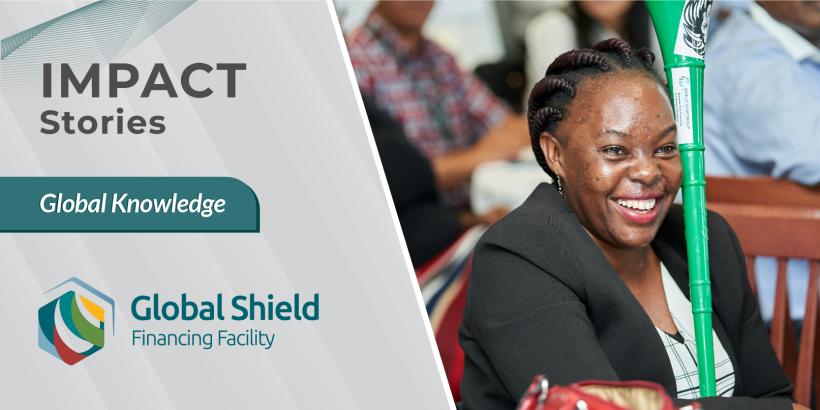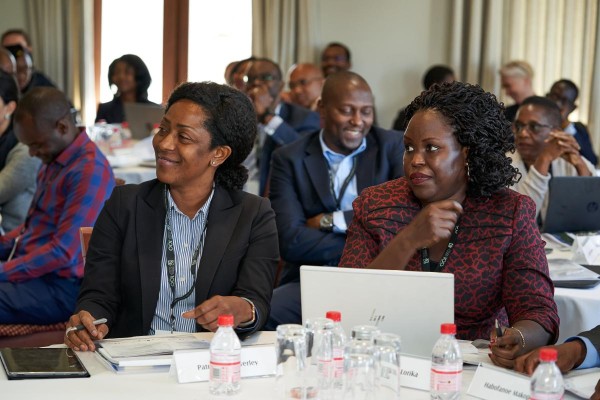The Global Shield Financing Facility's Stories of Impact | Promoting Global Knowledge to Enhance Technical Operations

The Global Shield Financing Facility (GSFF) combats the fragmentation of climate and disaster risk finance and insurance initiatives through active collaboration with diverse stakeholders, thereby promoting efficient resource allocation and a unified global response. Under its first pillar, which focuses on global engagements, GSFF contributes significantly to closing the protection gap, in part by partnering closely with the Global Shield against Climate Risks and its working groups, in-country processes, and governance bodies. As one of the Global Shield’s three financing vehicles, GSFF works alongside the other two—the Global Shield Solutions Platform and the Climate Vulnerable Forum/V20 Joint Multi-Donor Fund—to enhance the global effectiveness of climate and disaster risk finance and insurance.
The GSFF makes innovation investment grants that target gaps in the quality and accessibility of risk data in lower-income or conflict-affected countries, where data are often scarce and information does not stretch far enough back to sufficiently analyze trends. Innovation investments aim to enhance technical expertise within under-resourced countries and to encourage the development of solutions that are more relevant and appropriate to their circumstances.
In Malawi, Global Risk Financing Facility (GRiF) analytical tools incorporating risk inputs, such as satellite-derived rainfall and vegetation data, assess the severity of droughts across different regions. This information is then used by the government to scale up social protection payments during times of greatest need, optimizing the adaptive social protection system.
A US$4.2 million innovation investment grant was awarded to the Crisis Risk Finance Analytics (CRFA) program, which leverages technological advances to improve the information used to inform pre-arranged financing solutions. Under this program, the World Bank has partnered with the European Space Agency to link information from on-the-ground operations with the most sophisticated analytical technology, making it easier to scale up climate and disaster risk financing in a sustainable, robust, and transparent manner. In Morocco, this work is informing the strengthening of the solidarity fund for catastrophic events mechanism to include new risks and respond more effectively aftershocks.
The GSFF aims to make the CRFA toolkit more widely available. The focus is on advancing DRF through research and development, making this knowledge accessible for informed decision-making. The Next Generation Drought Index (NGDI)—the product of a World Bank collaboration with experts across academia, technical consultancies, and satellite companies—is an essential tool that comprehensively assesses drought in specific regions.
The NGDI’s “convergence of evidence” approach collects drought data for multiple purposes, including decision-making, adaptive social protection, and agricultural insurance.
Integrated Operational Capacity-Building Approach
The GSFF has been instrumental in providing client countries with knowledge and expertise on financial risk management for disasters, climate shocks, and other crises. It has worked toward establishing a standard skill set to bring tailored guidance to Ministries of Finance and other relevant stakeholders.

The GSFF website serves as a digital knowledge platform, attracting over 50,000 views annually. Over 2,000 professionals have availed themselves of GSFF annual technical talks; these have become a nexus for industry dialogue that fosters collaboration and enables shared insights. The financial support of GRiF in FY23 led to the production of over 30 knowledge products. Among them was the “Women in Risk Finance” webinar, which was delivered on International Women’s Day. This annual webinar emphasizes the integral intersection of gender and financial resilience; its associated podcast consistently receives significant attention and has averaged 3,250 downloads per episode. The GSFF-financed “In the Spotlight” series, whose publications have garnered over 20,000 reads each, strategically showcases the journeys of influential DRF leaders and trailblazing DRF projects. The GSFF focuses not just on amplifying the dialogue but also on driving impactful changes and innovations in the realm of disaster risk finance.
In FY23, through a bilingual ‘training of trainers’ initiative carried out in collaboration with the National University of Costa Rica (a Global Shield pathfinder country), the GSFF trained academics and local government representatives to further scale learning and technical knowledge on DRF.
This initiative, co-financed by the Risk Finance Umbrella Program, has been instrumental in expanding DRF knowledge and underlines the GSFF’s commitment to cultivating a well-informed community.
Global Capacity Strengthening Program
The GRiF-funded Global Capacity Strengthening Program aims to empower government officials in developing countries to design and implement financial solutions for climate shocks, disasters, and crises.
It offers in-country support, access to international expertise, and customized training. Strengthened government capacity increases the sustainability of financial instruments co-financed by GSFF. The program has three components: resident advisors (local hires), international mentors (specialized experts), and a technical capacity building ecosystem to support risk finance operations and empower stakeholders with knowledge and skills in crisis and disaster risk finance. A pilot program was delivered and tested in Indonesia, where a Risk Finance Fellow was placed within the government to help develop and scale the Public Assets Program.
Three Core Knowledge Building Blocks
The GSFF also co-finances three core knowledge building blocks that provide GSFF client countries with operational capacity strengthening as well as comprehensive learning and knowledge resources:
The Financial Protection Academy’s offerings are demand-driven and directly linked to the World Bank’s and GSFF’s operational projects; this entity has trained more than 30,000 stakeholders in both in-person and virtual settings. Product offerings include e-learning, webinars, stand-alone learning modules, toolkits, interactive games, virtual certification series, and executive education programs. Programs include partnerships with global universities like University of Cambridge (UK), Stanford University (US), Georgetown University (US), University of Stellenbosch (South Africa), University of Antananarivo (Madagascar), National University of Singapore, and BRAC University (Bangladesh), among others. Other knowledge partners include the Commonwealth Secretariat, InsuResilience Global Partnership, Centre for Disaster Protection, World Food Programme, International Federation of Red Cross and Red Crescent Societies, BRAC Bangladesh, and the Start Network.
The Financial Protection Forum is a global knowledge repository on DRF and a one-stop information platform enabling wider distribution of publications, learning materials, and case studies and serving as a virtual convening space for knowledge and exchange on DRF. The Global Risk Finance Capacity Strengthening Program will leverage and scale the resources and credibility built through this already established knowledge ecosystem.
The DRF Community of Practice (COP) is among the largest and most active groups of DRF practitioners and professionals worldwide, and the fastest-growing COP within the World Bank Group. The DRF COP allows clients to participate in discussions and build valuable relationships, and it provides practitioners support through a network of online and offline COP events and activities. Established in 2016, the DRF CoP now has over 10,000 members globally.
*The Global Risk Financing Facility's portfolio and programs have also been transferred to the Global Shield Financing Facility for continuation, in addition to new programming to be developed under the Global Shield initiative.